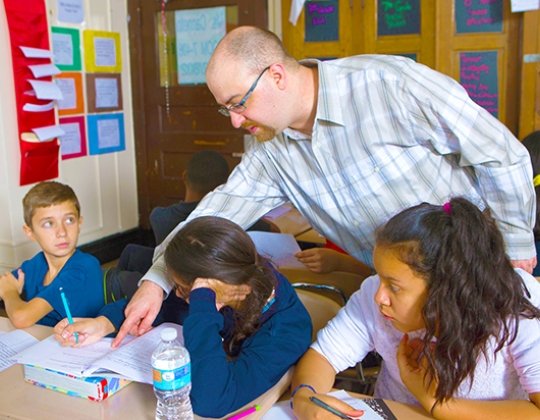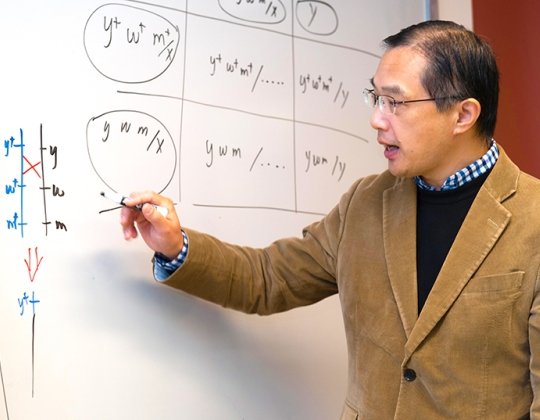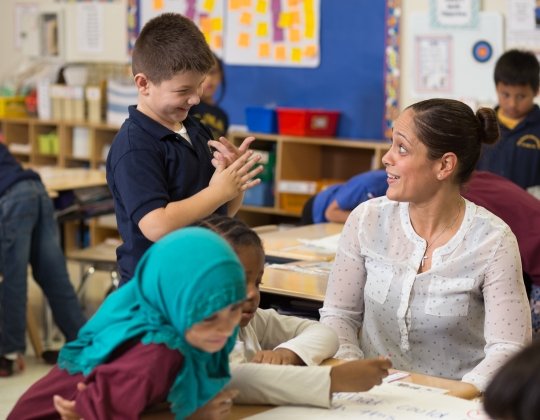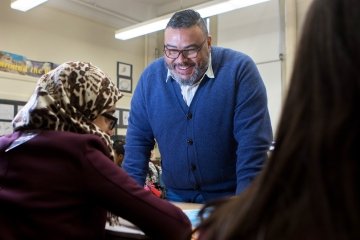
School of Education
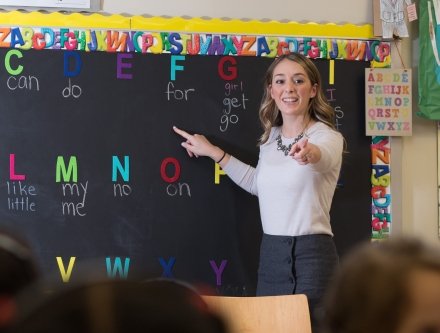
About the School of Education
The Mercy University educational unit is dedicated to preparing effective educators, including teachers and other school professionals, who are reflective practitioners, equipped with the knowledge base, technological skills, research tools, and professional strategies and insights to empower them to help diverse populations of students succeed in their learning and community environments.
The values of competency, diversity, and ethical practice support the proficient development of candidates enabling them to become skilled professionals and lifelong learners. The unit is committed to creating innovative, flexible, and accessible programs of study for its candidates, and to developing partnerships and opportunities for collaboration and clinical experiences within Mercy University and with external communities.
School of Education Degrees & Programs
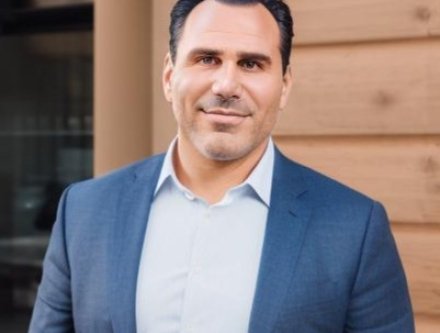
Message from Dean Eric Martone
As Dean, I welcome you to the School of Education! Nelson Mandela once said, "Education is the most powerful weapon which you can use to change the world." Here at Mercy University, our programs span the entire educational spectrum from early childhood through high school, including offerings in early childhood, childhood, secondary education, literacy, TESOL, bilingual education, special education and educational leadership. We also offer a unique five-year program, so you can begin taking graduate classes as an undergraduate, and earn a bachelor's and a master’s degree in five years.
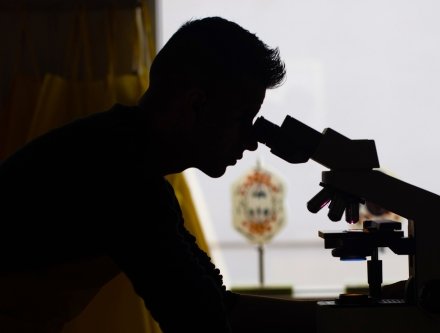
Center for STEM Education
The Mercy University Center for STEM Education (CSE), creates opportunities for groups typically underrepresented in STEM to engage in enrichment activities for learning, career readiness, enjoyment, and personal and community growth. As the only such academic center in the Westchester and Rockland region, CSE hosts events, organizes activities and conducts community outreach that includes local schools and related research on STEM education. The CSE partners with Mercy faculty on initiatives and grants and provides opportunities for School of Education students to volunteer in the community and support STEM-related projects.
Latest News
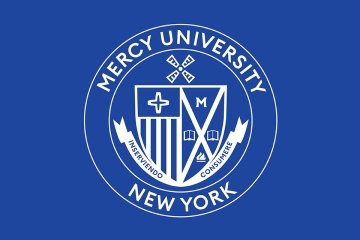
Thursday August 8, 2024
Mercy University and BloomBoard Partner to Create Accessible Teaching Pathways to Address New York's Teacher Shortage
Read MoreMonday August 5, 2024
Verizon STEM Program at Mercy University Empowers 138 Bronx and Westchester Middle Schoolers
Read More
Wednesday July 31, 2024
Mercy University Partners With Teach For America to Offer Graduate Program Benefits to Aspiring Teachers
Read More
Global Education Review
Global Education Review is a forum for reporting approaches to and implications of educational practice, as well as the influence of social, economic, and political forces on educational practice in different countries or global regions. GER is published in thematic and non-thematic issues that reflect on historical and contemporary policy and practice in educational settings in the United States and abroad. Selected themes focus on issues that are relevant to the field of education, with implications for policy nationally and/or globally.
School of Education Accolades
Ranked #4 on Learn.org's 2020 Best Online Master's in Education Programs
Important Information
| AY 22-23 | AY 23-24 | |
|---|---|---|
| Early Childhood and Childhood | 332 | 368 |
| Education (STEM) | 12 | 1 |
| Literacy and Multilingual Studies | 107 | 138 |
| Secondary Education | 89 | 87 |
| Educational Leadership | 43 | 40 |
| Special Education | 54 | 66 |
| Special Programs (Education) | 23 | 15 |
| 5-Year Program | 384 | 414 |
| School Counseling | 16 | 9 |
| School Psychology | 69 | 68 |
A trailblazer in the field of education, the Mercy University School of Education became the first institution in the United States to be awarded initial national accreditation by the National Council for the Accreditation of Teacher Education (NCATE) and its successor organization, the Council for the Accreditation of Educator Professionals (CAEP). In addition, all of our master's degree education programs in Childhood, Early Childhood, Secondary Education (English, Mathematics, Biology, Physics, Chemistry, and Social Studies), Special Education, TESOL, Literacy, and Educational Leadership are nationally recognized by their professional associations. National accreditation provides a seal of approval for Mercy and enhances our graduates' credentials when seeking employment.
Under Title II of the Higher Education Authorization Act, institutions with teacher preparation programs must report to their respective state (New York State Education Department) on specific data elements related to teacher programs annually. This information is compiled and made available to the general public by the US Department of Education on the aggregate level, by state, and by respective institution on an annual basis.
The Unit Mission:
The unit is dedicated to preparing effective educators, including teachers and other school professionals who are reflective practitioners and have the knowledge base, technological skills, research tools and professional proficiencies and dispositions to empower them to help diverse students succeed in their learning and community environments. The unit supports the values of competency, diversity, collaboration and ethical practice and commits itself to the tenet that all students can learn.
A Coherent Plan for the Preparation of Teachers and other School Professionals:
The Mercy University Conceptual Framework represents the group effort of faculty members in all unit programs to establish the philosophy, governing principles and standards to guide the unit and its individual programs. Through a consistent plan for curriculum, instruction, fieldwork, clinical practice and assessment, the Conceptual Framework sets forth the shared vision, mission, professional commitments and explicit proficiencies and dispositions the unit considers to be requisites for the preparation of teachers and other school professionals, enabling them to become Effective Educators.
Professional Education Unit Programs:
Programs in the School of Education:
- Early Childhood Education
- Childhood Education
- Secondary Education: Science (Biology, Physics, Chemistry), English, Mathematics, Social Studies
- Literacy
- TESOL
- Special Education
- Educational Leadership
Programs in the School of Social and Behavioral Sciences:
- School Counseling
- School Psychology
Unit Goals:
Unit values and competencies are supported by the six goals and related proficiencies that define the effective educator in the unit’s Conceptual Framework. The six goals are: Content Knowledge, Pedagogical and Professional Knowledge, Diversity, Technology, Reflection and Dispositions.
Overview of the Mercy University Educational Unit Candidate Goals and Proficiencies:
| Candidate Goals | Candidate Proficiencies |
|---|---|
| 1. Content Knowledge |
1.1 Demonstrate knowledge of current research, theory, models and practice in the discipline or content area 1.2 Exhibit competency in the discipline or content area |
| 2. Pedagogical and Professional Knowledge |
2.1 Plan and deliver instruction and professional services to address students' cognitive, linguistic, academic, cultural, social, emotional and physical strength and needs 2.2 Implement differentiated strategies that align with professional standards 2.3 Use assessment and other data based sources of information describe, inform and document student learning |
| 3. Diversity |
3.1 Implement curricula of inclusion and provide intervention services that respect and build on the strengths of students from diverse experiential backgrounds 3.2 Demonstrate fairness and equity in instructional and professional practice 3.3 Exhibit awareness of how students' cultural, linguistic, ethnic and experiential backgrounds contribute to the school and broader communities |
| 4. Technology |
4.1 Analyze and evaluate existing and emerging technological tools for advancing education goals and data-based decision making 4.2 Adapt technology effectively for student learning 4.3 Adhere to the ethical, legal and professional standards of technology |
| 5. Reflection |
5.1 Apply current, evidence-based research to improve practice 5.2 Use self-evaluation for instructional and professional planning, promote health and well-being and maintain a safe and effective learning environment |
| 6. Dispositions |
6.1 Demonstrate commitment to ethical and legal practice through professional behaviors and consistent adherence to ethical standards 6.2 Demonstrate respect for the roles of all stakeholders in the school and broader communities 6.3 Demonstrate the belief that all students can learn through respectful interaction and by providing experiences that encourage all students to be successful learners |
Assessment:
The unit has developed an assessment system to support the implementation of these goals and to help stakeholders better evaluate unit effectiveness and determine areas for improvement. It outlines a process for continuous review of the effectiveness of the unit’s programs and operations serving our candidates, and includes a wide array of assessment processes, including course based key assessments to evaluate candidates’ progress, course evaluations to evaluate instructional effectiveness, exit and one-year follow up surveys to examine candidates perceptions of the effectiveness of the unit’s programs, as well as employer surveys to obtain their employers’ perspectives on our graduates’ preparedness for employment in the field of education.
An Emphasis on Diversity:
The Conceptual Framework threads the values of diversity through the content, pedagogical and clinical proficiencies and professional dispositions required of unit candidates for teaching and other school professions. Within its curricula, assignments and standards for clinical practice, the unit stresses inclusion and respect for the ethnic, cultural and linguistic differences among its candidates and faculty and for those of students, parents and staff in P-12 communities. Mercy University is a federally- designated Hispanic-Serving Institution proud to serve a diverse candidate population and was ranked in the top 100 schools awarding master’s degrees to Hispanics (Hispanic Outlook 5/072012). The unit strives to recruit and develop teachers and other school professional candidates from ethnically and culturally diverse backgrounds who demonstrate their potential to provide quality instruction to all learners.
In their progression through their professional education programs, candidates have the opportunity to interact with each other and with university faculty in richly diverse environment. The faculty provides candidates with the academic and pedagogical context to integrate research and standards-based curricula into practice and provides knowledge into how cultural, linguistic, ethnic and experiential backgrounds contribute to solving problems.
Key assessments results indicate that candidates demonstrate the ability to work with students, families and colleagues in ways that reflect the various proficiencies and dispositions expected of them as professional educators. They demonstrate understanding, professional behaviors and values that are consistent with the belief that all students can learn.
Contact the School of Education
Eric Martone, Ph.D.
Dean, School of Education
(914) 674-7618
emartone@mercy.edu
Mercy Hall SE 25J
Mary Ellen Hoffman, M.S.
Associate Dean for Administration
(914) 674-7334
mehoffman@mercy.edu
Mercy Hall SE 25C
Roseanne Vallice Levy, Ph.D.
Associate Dean for Academic Affairs
rvallice@mercy.edu
(914) 674-7689
Mercy Hall SE 25I
Judith Giampia
Assistant to the Dean
(914) 674-7235
jgiampia@mercy.edu
Mercy Hall SE 25

